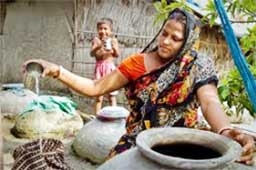
Dr. Md Asadul Islam & Md Shahadat Hossain :
Bangladesh is one of the most populated countries in the world with its shiny economic development prospect in the coming years if it can overcome existing and forthcoming challenges such as floods, droughts, cyclones, earthquakes and so on. All these common disasters are causing devastating upheaval to the lives of citizens of the country. In addition to these significant challenges, the lack of safe drinking water can be a substantial threat to the healthy life of current and future generations of the country. It is because most of the people of the country living in urban and rural areas depend on the groundwater for drinking, daily usage and irrigation. However, the increased level of arsenic in the groundwater across Bangladesh has been a severe issue to look for alternative sources so that people can have enough safe water for various purposes. Moreover, continuous decline in the shallow groundwater level has already proven it as an unsustainable source of water for drinking water and low-cost water pumping for irrigation threatening food security. Depletion of the water table has also been alarming for Dhaka and other major cities of the country.
Bangladesh ranks 7 out of 10 countries in the Asia Pacific region that mainly depend on groundwater for safe drinking and irrigation. But this dependency of the country on the groundwater requires a dramatic reduction not only for the safe drinking and irrigation water facility development but also for achieving the country’s ambition to be a developed country by 2041. Recently, World Bank reported that around 5pc-24pc of Bangladesh’s total land is exposed to high risk to extremely high risks of salinity, arsenic, and groundwater depletion hazards. Moreover, UN Development Program has found that 73pc of people living in the coastal areas of Bangladesh are currently forced to drink unsafe saline water. The situation can worsen in the near future; hence, it requires urgent attention of national and international planners.
Drinking unsafe water is not only a problem for the people living in coastal areas of Bangladesh; it is also a significant problem for the people living in the major cities of the country. For example, many people, especially poor ones living in Dhaka, Chittagong, Sylhet, Cumilla, Gajipur, Sylhet, Khulna, Rajshahi and so on, suffer from water-related diseases such as cholera, diarrhea, dysentery, hepatitis A and so on. Moreover, the climate change issue can also deteriorate the situation because the increased temperature will accelerate the demand for safe water for drinking, irrigation and industrial usage. Thus, Water Aid opined that the challenge of providing safe water for drinking, irrigation and industrial use is a complicated national problem for Bangladesh. Hence, it is high time for the country to look for an alternative source of safe water for drinking and irrigation. In this regard, rainwater harvesting across Bangladesh can be a sustainable solution to the safe water crisis in both urban and rural areas. Because it is a very wet country receiving on average of about 2200 millimeters (MM) rainfall per year while 70pc of it occurs between May and September. The rainwater is free from arsenic contamination while it is also safe from different chemical and bacteriological threats. Thus, rainwater can be used for both potable and non-potable purposes.
More than 150bn liter rain water could be harvested in Dhaka alone during the monsoon season. In this regard, the current demand of water in Dhaka city is approximately 2,474 MLD, but the production is 2087.5, hence, the harvested rainwater could be useful to meet the demand and save future usage. Thus, it can be argued that rainwater harvesting can be a significant potential safe water source for this populated and environmentally vulnerable city. If the country can initiate rainwater harvesting in a commercial way, it can ensure not only economic benefit but also ensure healthier life of people living in urbans and rural areas of Bangladesh. It is because most of the people here are unaware of rainwater harvesting and the potential threat of high dependency on the ground and processed water. In this regard, the government and non-government organizations (NGOs) will have to play a pioneering role in developing rainwater harvesting facilities.
Moreover, the more prominent private companies and celebrities can also play a significant role in developing awareness regarding the benefits of rainwater harvesting and usage. Thus, commercial rainwater harvesting will be common in Bangladesh, leading the country to overcome the water shortage and improve people’s health in the long run. It will also enhance the reputation of the country in terms of the achievement of sustainable development goals (SDGs).
(Dr. Md Asadul Islam is Assistant Professor, BRAC Business School, BRAC University and Md Shahadat Hossain is PhD Scholar, University Putra Malaysia).

